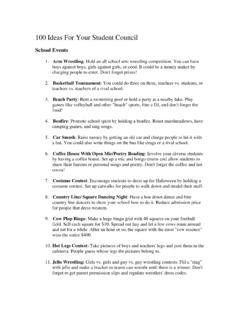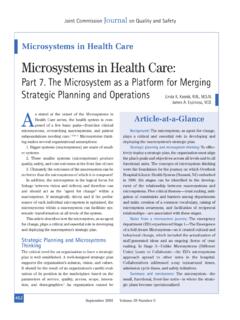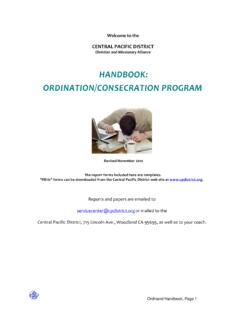Transcription of Chapter 1 Introduction to Transpersonal Psychology
1 Chapter 1 Introduction to Transpersonal Psychology Chapter 1 Introduction TO Transpersonal Psychology Learning Objectives 1. Compare and contrast the perspectives of mainstream Psychology and Transpersonal Psychology toward human spirituality. 2. List the goals of Transpersonal Psychology . 3. Identify key themes in definitions of Transpersonal Psychology cited in the literature. 4. Identify at least five definitions of "transcendence beyond ego" proposed by Abraham Maslow. 5. Describe the two types of "transcendent" abilities identified by John Curtis Gowan. 6. Define Transpersonal experiences.
2 7. Define Transpersonal behaviors. 8. Name topics studied in Transpersonal Psychology 9. Give examples of exceptional human experiences. 10. Tell why exceptional experiences are considered "anomalous" by mainstream Psychology . 11. Describe how exceptional human experiences are viewed by Transpersonal Psychology . 12. Tell why experiential exercises and practices are important in learning about Transpersonal concepts. 13. Distinguish between the personalistic and naturalistic approaches to the history of Transpersonal Psychology . 14. Explain why the founder of experimental Psychology can be considered a founder of Transpersonal Psychology .
3 15. Explain why William James can be considered "the father of modern Transpersonal Psychology and psychiatry." 16. Describe the contribution of F. W. H. Myers's concept of the "subliminal self" to the development of Transpersonal Psychology . 17. Describe the role that Sigmund Freud played in the history of Transpersonal Psychology . 18. Describe the contribution of Alfred Adler's concept of the "creative self" to Psychology . 19. List the significant contributions that C. G. Jung made in the history of Transpersonal Psychology . 20. Describe Roberto Assagioli's contribution to Transpersonal Psychology .
4 21. Tell how Transpersonal Psychology is a reflection of America's "alternative reality" and "folk Psychology " traditions. 22. Describe the contribution that psychical research plays in the history of Transpersonal Psychology . 23. Describe the contribution of Eastern and Asian systems of thought to the development of Transpersonal Psychology . 24. Describe the role that the Counterculture movement played in the history of Transpersonal Psychology . 25. Discuss how humanistic Psychology provided an alternative perspective in mainstream Psychology . 26. Describe the relationship between humanistic and Transpersonal Psychology .
5 27. Give examples of how Transpersonal Psychology has become a professional and global movement. 29. Name at least five important milestones in the history of Transpersonal Psychology . 30. Describe how Transpersonal Psychology employs an integral perspective toward experience and behavior. 30. Identify and assess the four key ideas that define a Transpersonal orientation. 31. Distinguish and appraise the various theoretical orientations, philosophies, and worldview in Transpersonal Psychology . Chapter 1 Introduction to Transpersonal Psychology 32. Describe the key ideas in the "Perennial Philosophy" and explain why it is considered to be universal.
6 33. List and evaluate the four criticisms of the Perennial Philosophy mentioned by Jorge Ferrer. 34. Describe the integral approach used in Transpersonal Psychology and identify the "mistake" that its use avoids. 35. Name the kinds of traditional qualitative and quantitative research methods used in Transpersonal research. 36. List and describe the varieties of original transpersonally-oriented research methods that have been developed to study exceptional experiences and behaviors. 37. Tell why non-experimental evidence remains an extremely valuable source of information concerning the nature, limits, and reality of Transpersonal phenomena.
7 38. Compare and contrast Transpersonal and traditional approaches to research. 39. Explain how Transpersonal Psychology is a science. 40. Summarize the contribution of Transpersonal Psychology to the study of exceptional experiences and transformative behaviors. Chapter 1 Introduction to Transpersonal Psychology Chapter Outline I. The Scope of Transpersonal Psychology A. Spirituality in Contemporary Life and Modern Psychology 1. Social and cultural interest in spirituality is not a passing fad. 2. Interest in spirituality extends to modern Psychology .
8 3. Mainstream Psychology 's view of religion and spirituality has not always been a positive one. 4. The promise of Transpersonal Psychology . a. Expand the individual's understanding of the "unknown" elements of the self and its greater world. b. Broaden "official" concepts about the self to reveal the multidimensional nature of the human psyche. c. Enlarge the vision of modern Psychology to include a new, wider view of the co-participatory nature of reality.
9 D. Develop a greater understanding of human potentials and abilities. e. Propose an alternate view of human nature in order that the individual and the species may achieve its greatest fulfillment. II. What is Transpersonal Psychology ? A. Definitions and themes of Transpersonal Psychology 1. Published definitions of Transpersonal Psychology (1967-2003) 2. Thematic analysis of definitions a.
10 1968-1991 (Lajoie & Shapiro, 1992). 1. States of consciousness 2. Highest or ultimate potential 3. Beyond ego or personal self 4. Transcendence 5. Spiritual b. 1991-2001 (Shapiro, Lee, & Gross, 2002) Going beyond or transcending the individual, ego, self, the personal, personality, or personal identity; existence of a deeper, true, or authentic self. Spirituality, psychospiritual, psychospiritual development, the spiritual, spirit. c. General sources (Hartelius, Caplan, & Rardin, 2007) Psychology beyond ego Integrative/holistic Psychology Psychology of transformation 3.











